This article was written by me as an assignment for the Ethereum.org Writers Cohort program. If there were no deadline, I would not have published it. So thanks to my colleagues and the team for organizing this. I'm not happy with my article but it's good to break through the fear of publishing.
Este artículo está escrito en inglés y español. Para ir a la versión en español, bajá por favor hasta el final.
Unveiling the Latin American Participation Gap in Web3 Governance
The dream of a united Latin America dates back to the era of the independence wars (1800th), in which all the countries of the continent had to fight to achieve self-government and sovereignty against the colonial powers. However, for centuries, this dream has been nothing more than a romantic idea - and at times, a slogan appropriated by politicians in power. Latin American countries have been cyclically plagued by similar problems: shaky economies, corruption, destabilized governments, dictatorships, underdeveloped infrastructure, and hunger.
As a result of these failures in human coordination at the country and continental levels, our region has rarely been a weighty protagonist that tilts the balance in global political, economic, health, and social decision-making. We are relegated to being spectators, recipients, and acceptors of policies, legislations, and trends from major powers.
Will this ever change? Will we become decision-making players someday? A part of me dares to dream that it will... Let's see.
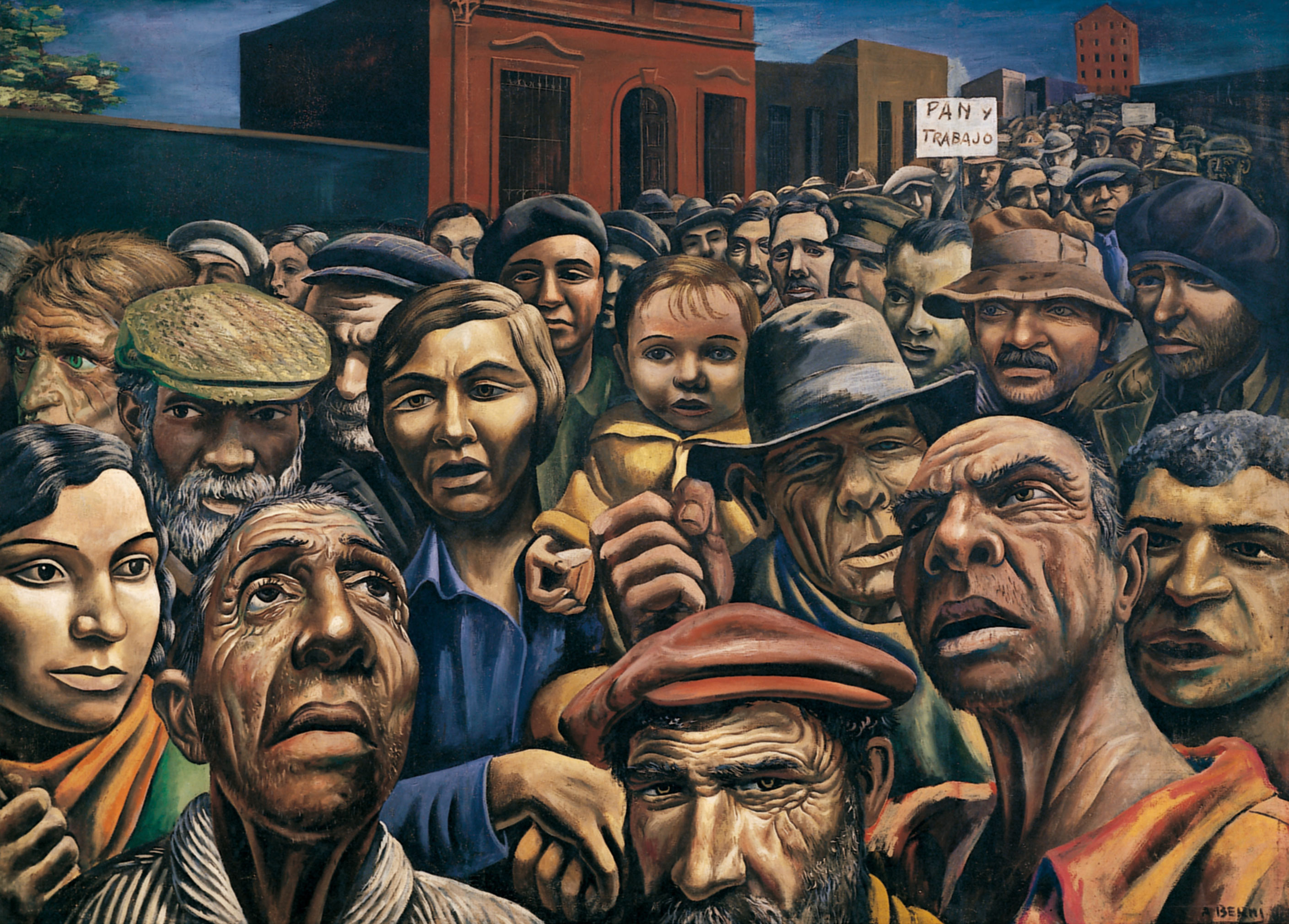
Decision-making in Web3: Governance
Many things are decided in governance. But in one sentence, we can say that the future of protocols / blockchains / DAOs are voted upon. Here are some points to see it clearly:
-
Resource distribution
-
Protocol upgrades
-
Architecture
-
Partnerships and collaborations
-
Dispute resolution
-
Member/team layoffs
-
Philosophy and ethos
The list is longer, but those categories encompass subcategories. Essentially, fundamental things for the destiny of a platform are voted upon. The results of the votes shape what we ultimately see on our device screens.
Voting processes are complex. They vary according to each governance. But generally, an idea (e.g., adding collateral or seeking funds for a specific team) must be transformed into a proposal, which needs to be presented in the forum, analyzed, questioned, preliminary votes (temperature check) are carried out, then it goes to the on-chain voting, and finally… gets executed. Or rejected in the worst case. Along this path, influences, interests, alliances, and private conversations come into play.
I tend to think of governance as the new parliaments of blockchain. Saying it like that, it seems like a game for nerds in an internet sub-niche. But these DAOs possess billions of dollars worth of treasures. This leads me to wonder, where does the money for development go?
Governance and builders: The case of Mean Finance
This case was pivotal for the core of SEED Latam. As a result of this event, we realized how important it was to get involved in governance.
Mean Finance is a protocol that allows decentralized Dollar-Cost Averaging (DCA). It is developed by three anons. I had the opportunity to converse with one of its founders several times. He once told me: "I created this protocol because I'm really bad at trading. But I want to buy $ETH, and I never know if I'm entering at the right or wrong time, and that frustrates me. So we devised this protocol for everyone who feels the same way or doesn't have time to trade." They built the protocol under lean conditions, far from large capital rounds that many VCs require not only equity but also your soul, haha.
Anyway, the opportunity arose to receive funding in Phase 1 of the Optimism governance. Mean Finance applied. At that time, Linda Xie was the delegate with the most voting power in the forum. And she voted "no" to Mean's proposal.
The reason? Mean Finance was a protocol with little Total Value Locked (TVL). So sad.
But what Linda Xie didn't see at that time was that Mean Finance had thousands of active positions, albeit small ones. In other words, retail users were using it with unique wallets.
There are protocols with significant TVL, but there is no guarantee that they are not whales moving their liquidity around in search of the best yield for their capital. Mean Finance was being left out due to a simple metric that overlooked the work of a Latin American team (consisting of three individuals) who were seeking clean financing. No lobbying, no contacts.
I decided to give them a little push:
And we achieved a positive effect. You can see the original here.

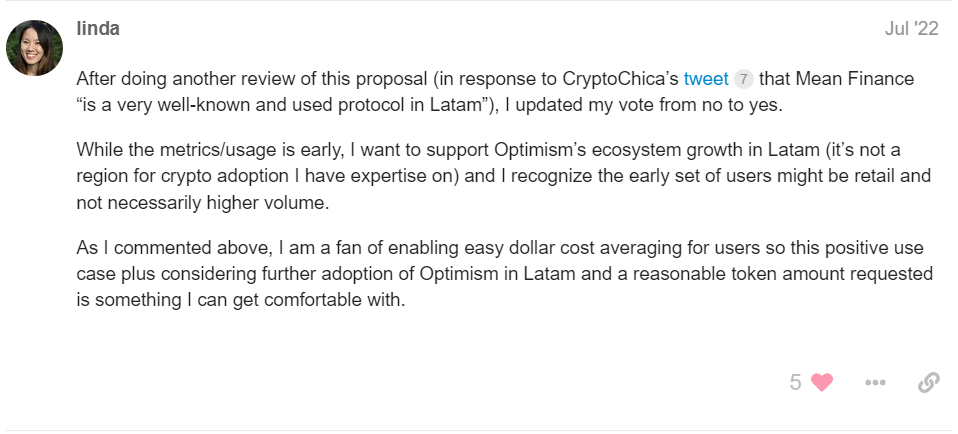
After crying out on Twitter, Linda changed her vote. You can see her original post in the forum here. That action caused other delegates with significant voting power to change their votes. Mean Finance made it through. WAGMI! We were all very happy. We realized that behind our computers, we could have an influence on processes that we previously considered to be in the "big leagues". Linda Xie is one of the most intelligent women in the ecosystem, with vast experience. And she had the humility to acknowledge that she had no experience in LatAm. And this is entirely natural. It is humanly impossible to be aware of innovation on all continents, be an investor, a wife, and a delegate. I clarify this so that Linda is not portrayed as the villain but as just another actor in this intricate thing called governance. (I will cover the issue of "burned out" delegates in another article in the future).
In those forums, people fight tooth and nail for their interests. And no one but yourself or your allies will fight for you, anonymously.
It's time to organize ourselves regionally.
Governance and the end-user
A few months ago, I visited my best friend. He welcomed me along with his wife, who is a pediatric intensive care physician. Her work is tough, and her salary is not as good as it should be. In a regular adult conversation, my friend asked me: "What are you working on now, Romi?" And I began telling them about SEED Latam, how we are working on launching delegate platforms from Latin America, trying to avoid technical terms like "voting power," "on-chain voting," "delegates." I managed to explain it with great difficulty. But the worst came when he asked me, "How does governance benefit my wife?" He told me that she had bought a significant amount of DAI to save and protect herself from peso ($ARS) devaluation. I'm an anxious person, so I tend to anticipate all possible scenarios. But there, at that table, in a town in my home province, I wanted to disappear. I internally felt ashamed of not having thought about that scenario. I attempted a quick response, and then we changed the subject.
But the question still resonates in my head: HOW DOES GOVERNANCE BENEFIT THE RETAIL USER?
I often think about this. One of the answers came over the weekend when we experienced the USDC depeg and affected on $DAI peg as collateral.
Many people were scared (and traumatized by the memory of the UST-LUNA crash). Coworkers, multisig members, development teams, users, family members, everyone was frightened. The most nervous ones chose to swap their DAI/USDC for USDT or convert to fiat, and many even shifted to BTC or ETH. During those moments, they lost between $200-300 in gas fees and the cost of price impact on DEXes. The more moderate ones urged calm and to wait until next Monday, hoping for a rescue. As a member of several multisigs safeguarding funds for the salaries of multiple contributors, I swallowed hard and prayed for the market to stabilize. What would happen if DAI suddenly didn't recover its peg?
This literally affected entire families. Many Telegram / Discord mods, translators, writers, devs, among other roles, support their families with salaries ranging from 500 to 1500 DAI per month. On the outskirts, we accept uncertainty as our daily bread.
As Mariano Conti, former Head of Smart Contracts at MakerDAO, said in his talk at ETH Latam, "decentralization doesn't matter until it does."
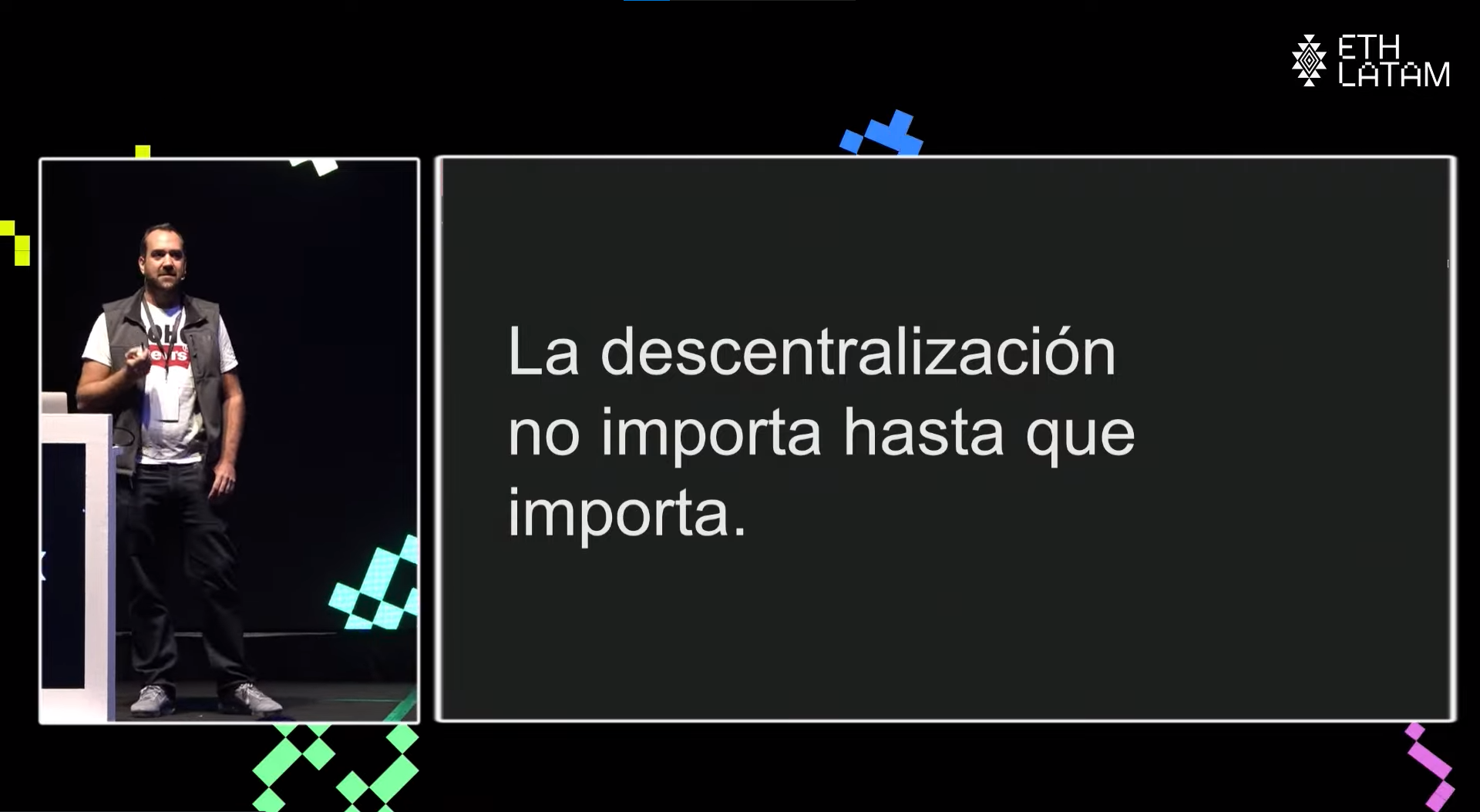
Who decides the backing of DAI? Who decides the risk and collateral ratio of DAI? Where are these things discussed?
The answer is:
✨ in governance ✨
All this reflection leads me to paraphrase Mariano: governance doesn't matter until it does.
Latin American Delegates: A Quick Mapping
As a region, we are the birthplace of well-known platforms in the crypto and blockchain ecosystem (just to name a few: Open Zeppelin, POAP, Decentraland, HardHat). We have millions of cryptocurrency and blockchain users, and we have an extensive and high-quality builder ecosystem. However, I feel we are not as strong in governance. I say "feel" because when I set out to search for pre-existing data, I found almost no information.
This leads me to think that we haven't looked at ourselves as a collective but as individuals. I'm not saying that it's a necessary view, but without concrete data, we cannot accurately assess the extent of Latin American representation in the decision-making processes that shape the future of Web3.
If we have data on our participation or even minimal knowledge, we can design effective strategies to promote greater inclusion and diversity in Web3 governance. It's not necessary for everyone to become delegates overnight, but having greater awareness and knowledge of the forums would be great, especially when delegating old tokens in our wallets. We all know that voter apathy is the biggest challenge in governance.
I stayed up late last Monday and started searching for articles, videos, posts, anything useful to find information about Latin American delegates. I had (and still have) so many questions. Who are they? What do they need? What content and values do their platforms have? Are there women? Are there pro delegates?
Of course, this list has a great bias: it only includes public delegates who have revealed their identity and origin. I'm all ears if you have any data or information to contribute and enrich this information. My idea is to have a report later on.
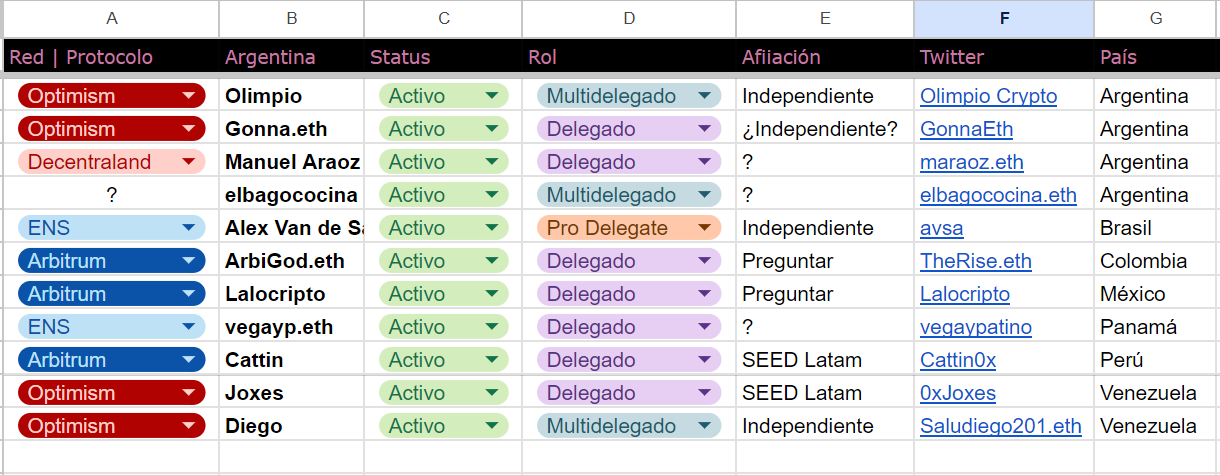
If you have information, ideas, or data regarding Latin American participation in Web3 governance, I kindly request you to send them to me.
You can reach me at romina@cryptochica.ar if you have any data or ideas to share. Together, we can empower individuals and communities in Latin America to actively shape the evolution of Web3 and ensure that our perspectives are properly considered. Ultimately, this will have a positive impact on end users.
If you are a delegate or know someone who is, please feel free to comment directly on the document to contribute, correct, or remove data.
Thank you for reading. In the Vol. II I will include more qualitative and quantitative data, testimonials and insights. You can mint this article for free as NFT on Optimism :)
If you wanna chat, this is my Telegram <3
UwU
Español ⬇️
Descubriendo la brecha de participación latinoamericana en la gobernanza Web3. Vol. I
El sueño de Latinoamérica unida se remonta a la época de guerras independentistas que todos los países del continente debieron librar para lograr el autogobierno y su soberanía frente a las potencias colonizadoras. Pero durante siglos este sueño no ha sido más que una idea romántica -y por momentos, una consigna apropiada por políticos de turno-. Los países de Latinoamérica se han visto azotados cíclicamente por problemas similares: economías tambaleantes, corrupción, gobiernos desestabilizados, dictaduras, poco desarrollo de infraestructura y hambre.
A raíz de estos fallos en la coordinación humana a nivel país - y a nivel continente- nuestra región casi nunca ha sido un protagonista de peso que incline la balanza en la toma de decisiones políticas, económicas, sanitarias y sociales a nivel mundial. Estamos relegados a ser espectadores, receptores, aceptadores de políticas, legislaciones y tendencias de las grandes potencias.
¿Cambiará esto algún día? ¿Seremos protagonistas en las tomas de decisiones? Una parte de mi se atreve a soñar que sí… Veamos.

Toma de decisiones en web3: Las gobernanzas
En las gobernanzas se deciden muchas cosas. Pero en una oración, podemos decir que se vota el futuro del protocolo / blockchain / DAO correspondiente. Algunos puntos para verlo de forma clara:
-
Distribución de recur$os
-
Upgrades de protocolos
-
Arquitectura
-
Alianzas y colaboraciones
-
Resolución de disputas
-
Desvinculación de miembros / equipos
-
Filosofía y ethos
La lista es más larga pero en esas categorías entran sub categorías. Básicamente se votan cosas fundamentales para el destino de una plataforma. Los resultados de las votaciones moldean lo que terminamos viendo en la pantalla de nuestro dispositivo.
Y las votaciones son procesos complejos. Varían según cada gobernanza. Pero generalmente una idea (ej.: agregar un colateral o buscar fondos para un equipo determinado) debe ser transformada en propuesta, que debe ser presentada en el foro, analizada, cuestionada, se realizan votaciones previas (temperature check) para luego ir a la votación on chain, lograr el voto y finalmente ser ejecutada. O rechazada en el peor de los casos. En ese camino se mueven influencias, intereses, alianzas, conversaciones privadas.
Suelo pensar en las gobernanzas como los parlamentos de blockchain. Dicho así, pareciera que es un juego de nerds en un subnicho de internet. Pero estas DAOs son poseedoras de tesoros de miles de millones de dólares. Lo que me lleva a preguntarme ¿a dónde va el dinero para desarrollo?
La gobernanza y los builders: el caso Mean Finance
Este caso fue fundamental para el core de SEED Latam. A raíz de este hecho, nos dimos cuenta de lo importante que era involucrarse en gobernanza.
Mean Finance es un protocolo que permite hacer DCA de forma descentralizada. Es desarrollado por 3 personas. Tuve oportunidad de conversar con uno de sus founders varias veces. Una vez me dijo: armé este protocolo porque soy muy malo en trading. Pero quiero comprar ETH, pero nunca sé si estoy entrando mal o bien, y eso me frustra. Así que ideamos este protocolo para todos los que se sienten así o no tienen tiempo para “tradear”. Han construido en protocolo en condiciones magras, lejos de grandes rondas de capital que muchos y VCs que además de equity, te piden el alma también jaja.
En fin, se presentó la oportunidad de recibir financiamiento en la Fase 1 de la gobernanza de Optimism. Mean Finance aplicó. Linda Xie en ese momento era la delegada con mayor poder de voto en el foro. Y votó “no” a la propuesta de Mean.
¿La razón? Mean Finance era un protocolo con poco TVL. Estaba chikito.
Pero lo que no vio Linda Xie en ese momento es que Mean Finance contaba con miles de posiciones activas, pero pequeñas. Es decir, el retail estaba utilizandolo con billeteras únicas. Hay protocolos con grandes TVL pero nada te asegura que no sean ballenas moviendo su liquidez de aquí para allá buscando el mejor rendimiento para su capital. Mean finance estaba quedando afuera por una simple métrica que dejaba de lado el trabajo de un equipo latinoamericano (son 3 personas) que buscaba limpiamente lograr financiamiento. Sin lobbys, sin contactos.
Decidí darles un pequeño empujón:
Y logramos un efecto positivo. Podés ver el original acá.

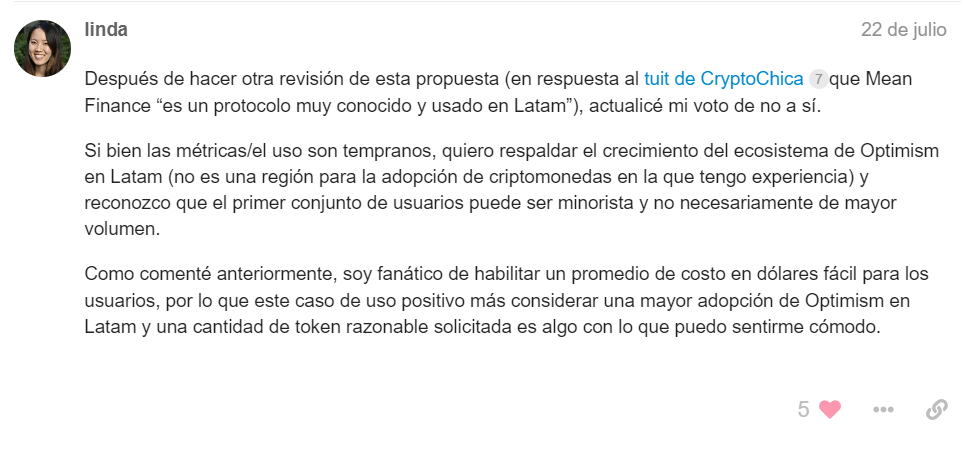
Después de llorar en Twitter, Linda cambió su voto. Pueden ver su post original en el foro acá. Y eso provocó que otros delegados con mucho voting power cambiaran su voto. Mean Finance pasó. Y todos fuimos muy felices. Nos dimos cuenta que detrás de nuestras computadoras podíamos tener ingerencia en procesos que antes considerabamos de “las grandes ligas”. Linda Xie es una de las mujeres más inteligentes del ecosistema, con una gran experiencia. Y tuvo la humildad de reconocer que no tenía experiencia en Latam. Y esto es totalmente natural. Humanamente es imposible estar al tanto de la innovación en todos los continentes, ser inversora, esposa y delegada. Aclaro esto para que Linda no quede como la villana, sino como un actor más en esta intrincada cosa llamada gobernanza.
Ahí, en esos foros, las personas pelean con uñas y dientes por sus intereses. Y nadie más que vos mismo o tus aliados van a pelear por vos, anon.
Es hora de organizarnos regionalmente.
La gobernanza y el usuario final
Hace unos meses visité a mi mejor amigo. Me recibió con su esposa. Ella es médica intensivista pediátrico. Su trabajo es duro y su salario no es tan bueno como debería. En una charla normal de adultos, me tocó responder a la pregunta ¿en qué estás trabajando ahora, Romi? Y comencé a hablarle de SEED Latam, de cómo estamos trabajando en lanzar plataformas de delegados desde Latinoamérica, tratando de esquivar tecnicismos como “token”, votación “on chain”, “delegados”. Lo logré a duras penas. Pero lo peor llegó cuando me preguntó “¿En qué beneficia la gobernanza a mi esposa”? Según me contaba, había comprado una cantidad de $DAI importante para poder ahorrar resguardarse de devaluación del peso. Soy una persona con ansiedad, así que suelo preveer todos los escenarios posibles. Pero ahí, en esa mesa, en un pueblo de mi provincia natal, tuve ganas de desaparecer. Me avergoncé internamente de no haber pensado en ese escenario. Ensayé una respuesta rápida y luego cambiamos de tema.
Pero todavía resuena en mi cabeza ¿EN QUÉ BENEFICIA LA GOBERNANZA AL RETAIL?
Pienso esto a menudo. Una de las respuestas llegó el fin de semana dónde vivimos el depeg de USDC y su efecto en DAI como colateral.
Muchas personas estaban asustadas (y traumatizadas por el recuerdo del crash UST-LUNA). Compañeros de trabajo, miembros de la multisig, equipos de desarrollo, usuarios, familiares, todos estaban asustados. Los más nerviosos eligieron hacer swaps de DAI / USDC a USDT, o pasar a fiat, e incluso muchos pasaron a BTC o ETH. En esos momentos perdieron entre 200-300 USD en gas fees y el costo del precio de impacto en DEXes. Los más moderados pedían calma y esperar hasta el lunes, esperando un rescate. Yo, como miembros de varias multisig que resguardan los fondos de los salarios de múltiples contribuidores, tragaba saliva y rogaba a Dios por la normalización del mercado. ¿Qué iba a pasar si de repente DAI no recuperaba el peg?
Literalmente esto afectaba a familias enteras. Muchos “mods” de Telegram, traductores, escritores, devs entre otros roles mantienen a sus familias con sueldos de 500 a 1500 DAI mensuales. En la periferia aceptamos la incertidumbre como el pan de cada día.
Cómo dijo Mariano Conti, ex jefe de Smart Contracts en MakerDAO, en su charla en ETH Latam “la descentralización no importa hasta que importa”.

¿Quién decide el respaldo de DAI? ¿Quién decide el riesgo y ratio de colaterales de DAI? ¿Dónde se charlan esas cosas?
La respuesta es:
✨ en gobernanza ✨
Y toda esta reflexión me lleva a parafrasear a Mariano: la gobernanza no importa hasta que importa.
Delegados latinoamericanos: un mapeo rápido
Como región, somos cuna de grandes plataformas archiconocidas en el ecosistema cripto y blockchain (para muestra, un botón: Open Zeppelin, POAP, Decentraland, HardHat), tenemos millones de usuarios de criptomonedas y blockchain, tenemos un ecosistema de builders extenso y de calidad. Pero creo que no somos tan fuertes en gobernanza. Digo “creo” porque cuando me aboqué a la tarea de buscar datos pre existentes, me encontré frente a casi nula información.
Esto me lleva a pensar que no nos hemos mirado como colectivo sino como individuos. Tampoco estoy diciendo que sea una visión necesaria. Sin embargo, sin datos concretos, no podemos evaluar con precisión el alcance de la representación latinoamericana en los procesos de toma de decisiones que configuran el futuro de Web3.
Si contamos con datos de nuestra participación o con mínimas nociones, podemos diseñar estrategias eficaces para fomentar una mayor inclusión y diversidad en la gobernanza de Web3. No es necesario que todos nos convirtamos de un día para otros en delegados, pero tener una mayor consciencia y conocimiento de los foros sería genial. Sobre todo a la hora de delegar tokens inmóviles en nuestra wallet. Todos sabemos que la apatía del votante es el mayor desafío en gobernanza.
Me desvelé el pasado lunes y comencé a buscar artículos, videos, post, lo que fuera útil para encontrar información sobre delegados de Latinoamérica. Tenía (tengo) tantas preguntas. ¿Quiénes son? ¿Qué necesitan? ¿Qué contenido y valores tienen sus plataformas? ¿Hay mujeres? ¿Hay pro delegates?
Por supuesto que este listado tiene un gran sesgo: sólo recoge a delegados públicos que han revelado su identidad y su origen. Soy todo oídos si desean aportar algún dato o información para enriquecer estos datos. Mi idea es tener un reporte más adelante.

Si posees información, ideas o datos sobre la participación latinoamericana en gobernanza Web3, te pido por favor que me los envíes.
Podés escribirme a romina@cryptochica.ar si tenés datos o ideas para compartir. Juntos podemos empoderar a los individuos y comunidades de América Latina para dar forma activa a la evolución de Web3 y asegurar que nuestras perspectivas sean debidamente consideradas. Y que al final del día, terminarán repercutiendo de forma positiva en el usuario final.
Si sos delegado, o conocés a alguien, podés comentar directamente sobre el documento para aportar, corregir o eliminar datos.

Gracias por leer. En la segunda entrega incluiré más datos cualitativos y cuantitativos, testimonios y visiones. Podés mintear gratis este artículo como NFT en Optimism :)
Si querés hablar, mi cuenta en Telegram es:
UwU